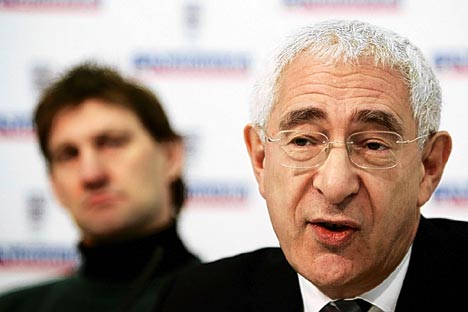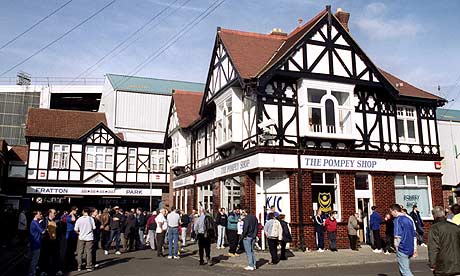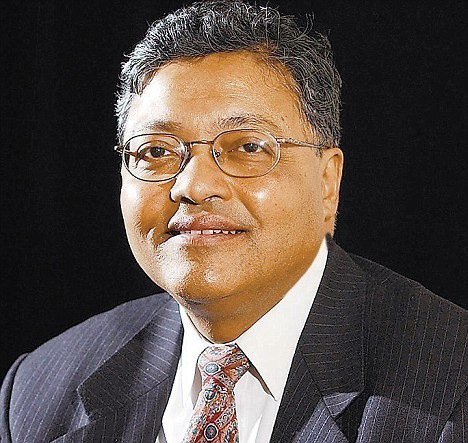What are the chances that the present debt crisis in football will lead to a regulator being appointed to administer the game?
Every time this question is posed, I am reminded of what happened in the mid-90s just before Labour came to power. Then the bungs issue led to much call for a regulator. Labour responded by appointing a Football Task Force. Tony Banks, Tony Blair’s rather surprising choice as Sports Minister, got his friend and fellow Chelsea supporter David Mellor to head it.
It went round the country and did diligent work but, while it produced some useful ideas, it did not lead to the fundamental change in the running of the game that many, including myself, felt was necessary.
Now talking to various people in and out of the game including politicians I sense that, despite all the alarm raised by the financial crisis in the game, the fundamental issue of football governance has not changed. There is no appetite for an independent regulator.
As Gordon Taylor, chief executive of the Professional Footballers Association, put it to me, “When we talk about an independent regulator, what do we mean by independence? Who is it actually independent from? Who judges the judges? You know FIFA doesn’t even want government regulators.”
Taylor you may say has a vested interest. In fact, on many issues such as the relationship between the FA and the Premier League, he makes shrewd points, in particular the fact that the FA, which is meant to regulate the game in this country, has always been more of a referee than a governor.
It had a chance to become governor when, in the 1990s, it allowed the old first division to break away from the Football League and set up as the Premier League. But, while it provided the new league a room in a cubby hole under the stairs of its old Lancaster Gate offices, it failed to grasp the nettle of governance and, having missed that boat, it cannot now catch up.
 Lord Triesman (pictured), arriving as the FA’s first independent chairman, did try and do some boat catching but this only created tension with Richard Scudamore, chief executive of the Premier League, and there is no sign that this breach will be healed.
Lord Triesman (pictured), arriving as the FA’s first independent chairman, did try and do some boat catching but this only created tension with Richard Scudamore, chief executive of the Premier League, and there is no sign that this breach will be healed.
To make matters worse, while the Premier League has gone from strength to strength, the FA Cup, the jewel in the FA’s crown which has always been the FA’s main concern, has been in danger of disintegrating.
There are complex reasons for this including the success of the Premier League, the launch of the Champions League - a European league in all but name - and also bad management by the FA.
All this has meant that, far from providing the sort of strict Victorian governance the game has needed, the FA’s hand on the tiller has been so gentle that the Premier League has become the biggest beast in the English football jungle, a beast so big that nobody wants to tweak its tail.
In a sense that is the real issue of regulation. When the Premier League was a cat there were not many prepared to bell it, now that it is a full blown tiger is there anybody brave enough to dare to try to tame it?
The Premier League’s success cannot be doubted. It is the most watched league in the world. And it has created a lot of wealth at a time when wealth wasn’t so easily created - and, to be fair, it does allow some of this wealth to trickle down to the grass roots.
I am writing from India where the Indian Premier League, the Twenty20 cricket tournament, has just started its third edition. One reason why the Indians were so keen to take up this new form of cricket was because they feared that the next generation of Indians might defect to football.
These young Indians have been brought up on a diet of English Premiership football on television, a diet that extends even to Kolkata’s Metro (in this, the only truly spotless place in the city, you can see endless repeats of Premiership matches). The Indian cricket administrators feared that their children would lose their interest in the game. Not for them Sachin Tendulkar but Wayne Rooney.
And, even on this visit, I have again been struck by how fascinated Indians are by the Premiership. Almost every Indian connected with the IPL has a team in the EPL and, the moment you say you are from England, the questions about Chelsea, Manchester United and Rooney and Co rain in.
Now some may argue that the success of the Premier League gives it a unique responsibility. It is the strongest league in the world so it should appreciate its strength and be accountable. It should not behave as the press lords of the 1930s whom Stanley Baldwin accused of enjoying “power without responsibility, the prerogative of the harlot throughout the ages”. As the FA does not act as governor of the game, the Premier League should make its de facto position de jure.
The most important exercise of this power would be for the Premier League to lay down what sort of club can become a member of the League. At the moment the Premier League is in the situation where it doesn’t mind whether a club is privately owned, owned by the members like Barcelona, a public company or a public company that’s been bought on a mountain of debt. It has no view on this subject, it is “ownership neutral”.
The Premier League’s position is that it is a group of 20 clubs and, while the names of the clubs change from season to season through promotion and relegation, the clubs have to agree to accept change. And asking the clubs to vote for change and lay down hard and fast rules on ownership is like asking turkeys to vote for Christmas.
 There are some who think that Portsmouth could be the game changer – so great is the embarrassment that a member of the most successful league in the world has gone into administration.
There are some who think that Portsmouth could be the game changer – so great is the embarrassment that a member of the most successful league in the world has gone into administration.
Yes the embarrassment is real, look down a league table and you see against a club’s name: minus 9 points, minus 10 points, minus 15 points – these deductions being nothing to do with the field of play, which the league table represents, but for financial problems leading to administration.
However I am not convinced that the Portsmouth disaster will lead to profound changes in football governance. There are many who see the present crisis as a hiccup and not at all comparable with the problems of the 1980s when, they argue, the game was in danger of vanishing from this country in disgrace: Mrs Thatcher blamed football for society’s problems and wanted ID cards for supporters.
Football managed to defeat that idea and then came the 1990s and a remarkable wind of uplifting change: some of the best stadiums were built, women and youngsters were attracted to the game, and anti-racism programmes were developed.
From that perspective, today’s problems do not call for major change.
But that does not mean that there will be no change. I can see some change coming, with pressure on the FA to be more inclusive and have on its governing body people who reflect the key stakeholders in the game including fans.
As is so often the case in this country, the changes will be small and incremental. The present crisis will not cause a football revolution, more an evolution in how the game is governed.

